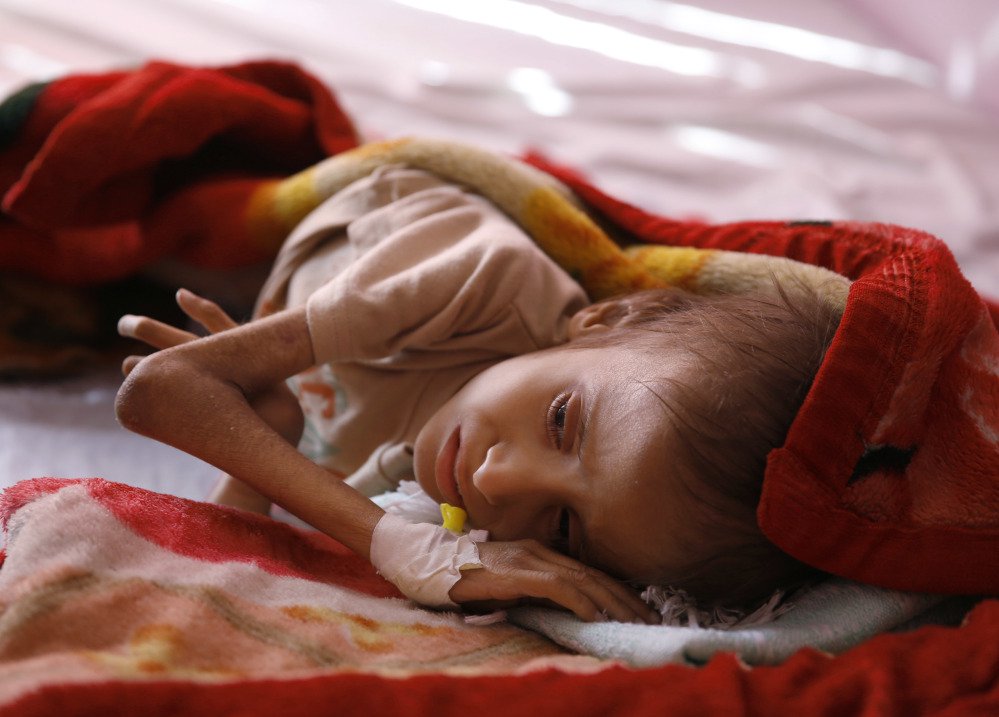Hodeida is the primary port of the broken Middle Eastern nation of Yemen, a country ripped apart by three years of civil war. United Arab Emirates-backed forces loyal to Yemen’s exiled government, together with Saudi air power, have launched an offensive to retake Hodeida, now held by Houthi rebels. The Houthis control much of the Arabian Peninsula nation and are well-entrenched in Hodeida. The fighting could drag on for months.
The peril isn’t confined to the 600,000-some Yemenis who live in Hodeida; the metropolis is a lifeline for Yemenis throughout the country. More than three-fourths of Yemen’s food arrives via the Red Sea port. The United Nations estimates that fighting in Hodeida could inflict mass starvation on as many as 8 million of the country’s 28 million Yemenis.
An estimated 50,000 Yemeni children already have died of starvation. More than a million Yemenis are infected with cholera. Yemen is already the world’s worst humanitarian disaster, and the looming battle for Hodeida could make that disaster far worse.
Western media haven’t yet paid extensive attention, so don’t feel neglectful if much of this is news to you.
But the magnitude of the suffering and a larger geopolitical struggle could raise the profile of the Yemenis and their plight. The war in Yemen has become a proxy conflict pitting Saudi Arabia and the United Arab Emirates, both longtime U.S. allies, against Iran, which Riyadh accuses of actively helping the Houthi rebels. The Saudis say Iran has been supplying the missiles Houthi forces are using to strike targets on Saudi territory. Saudi and Emirati fighter jets, meanwhile, have been behind a relentless bombing campaign against Houthi rebels that has killed thousands of Yemeni civilians.
The United States is not a bystander in this crisis. Washington provides intelligence, munitions and aerial refueling for Saudi and United Arab Emirates fighter jets. Since taking office, President Donald Trump has sought even closer ties with Riyadh. So it comes as no surprise that the Trump administration has said little about the peril Yemen’s people face.
But the U.S. can’t afford to stay silent as the suffering intensifies. If it does, it risks accusations of complicity in the horror unfolding in Yemen. “The U.S. already has blood on its hand in the Yemen crisis,” The Washington Post quoted U.S. Rep. Ted Lieu, D-Calif., as saying earlier this month. “We should not make them even bloodier.”
The Trump administration has enough sway with the Saudi and Emirati regimes to make the case for a halt to the offensive on Hodeida. If pushy diplomacy doesn’t work, the U.S. has another card to play — shutting down military support that Riyadh and Abu Dhabi need to fight the Houthis.
The alternative, allowing this mass starvation to intensify, cannot be an option.
Editorial by the Chicago Tribune
Visit the Chicago Tribune at www.chicagotribune.com
Distributed by Tribune Content Agency, LLC.
Send questions/comments to the editors.



Success. Please wait for the page to reload. If the page does not reload within 5 seconds, please refresh the page.
Enter your email and password to access comments.
Hi, to comment on stories you must . This profile is in addition to your subscription and website login.
Already have a commenting profile? .
Invalid username/password.
Please check your email to confirm and complete your registration.
Only subscribers are eligible to post comments. Please subscribe or login first for digital access. Here’s why.
Use the form below to reset your password. When you've submitted your account email, we will send an email with a reset code.